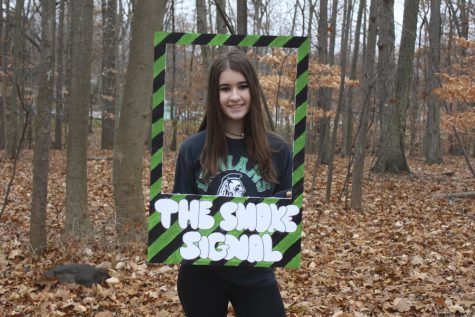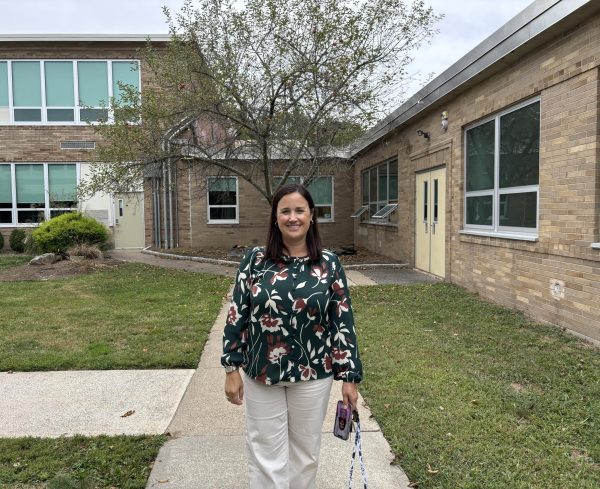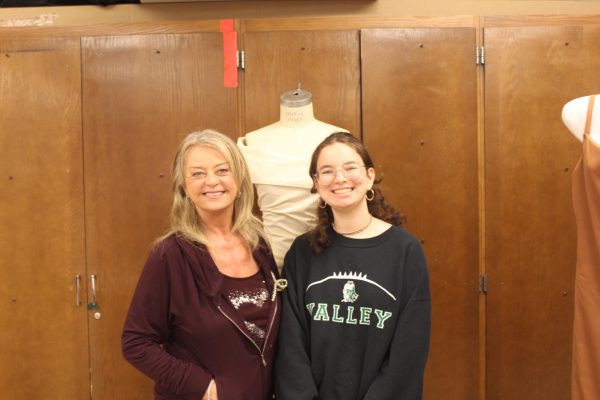Local filmmaker sheds light on heroin epidemic
PV graduate making a documentary to educate high school students
Ken Spooner speaks to Pascack Valley students during assembly.
(Editor’s Note: The incorrect release date of the film was originally published in the article. The correct release date is May 2018.)
Ken Spooner and his team set up their equipment and get their cameras rolling. They listen to the stories of five addicts and their two remaining family members who are not addicts, but still live with the effects of addiction in their lives.
The story of this family and others that have experienced heroin addiction in their loved ones’ lives will be included in Spooner’s upcoming documentary “Epidemic H.” The filmmakers are telling this family’s story through the eyes of a niece to show the effects of the drug from a child’s point of view.
Listening to these stories, Spooner remembers his own loved ones he lost to this epidemic.
“I lost three friends to heroin and I did not even really know they were using,” Spooner said. “Losing some friends and having people lose friends from [heroin] as what really inspired me to do something about it.”
Claiming roughly three times as many lives as the national average, the New Jersey heroin epidemic has affected not only the users, but their families and communities as well. Heroin is a highly addictive opioid drug and use results in a number of serious health conditions, including heart and lung infection, liver disease, and brain deterioration.
Spooner, a Pascack Valley graduate of 2008, and his team are working on educating people on this issue in their documentary.
Spooner first picked up a camera when he took a video production class his senior year of high school. His teacher, Ms. Elizabeth Manzella, saw potential in him and was able to give him the chance to discover his passion for filmmaking.
“Ken was a hard worker and had a passion for video production— which led him to get better and better with each film,” Manzella said. “It ignited his love of filming and storytelling. I’m in awe of his work today.”
Spooner then went on to attend Montclair State University, where his passion for filmmaking enabled him to travel the world to film school-funded documentaries.
“His professors and mentors at Montclair State and all of the various people he’s met and places he’s traveled have only ignited his passion more and more each step of the way,” Manzella said.
The film producer Edward Burns, who is a big inspiration for Spooner, makes films on a low budget and doesn’t sacrifice his creative freedom, a process Spooner uses in his own work.
Spooner learned something every time he picked up a camera in the making of this documentary, whether it be from hearing people’s stories or what questions to shy away from during the interview process.
“There is a very fine line between morals and ethics. You have to know what’s right and what’s wrong- you can’t push the limits and you have to stay as objective as possible,” Spooner said.
However, staying objective was not as easy as Spooner and his team would have liked, as many people working on the documentary have ties to someone that has been affected by heroin.
“People on the documentary team have either had struggles with addiction or know people with [an addiction],” he said.
One of the biggest struggles was having people open up about their experiences with the drug.
Though having experienced some bumps along the way, the team is managing to piece together these stories in an effort to have the documentary screened in high schools throughout the nation and to provide an inside look on what heroin is doing to users, families, and communities. The film is expected to be finished in May 2018.












